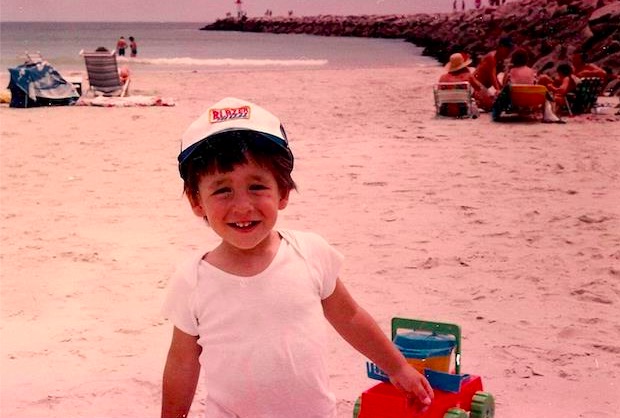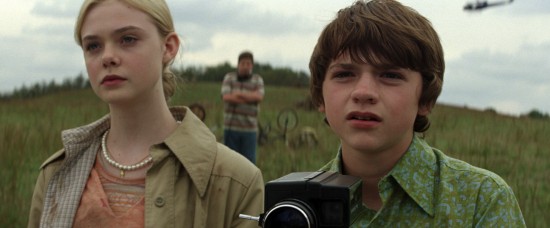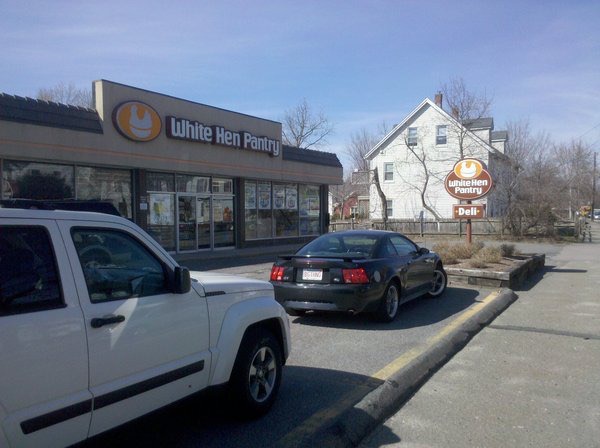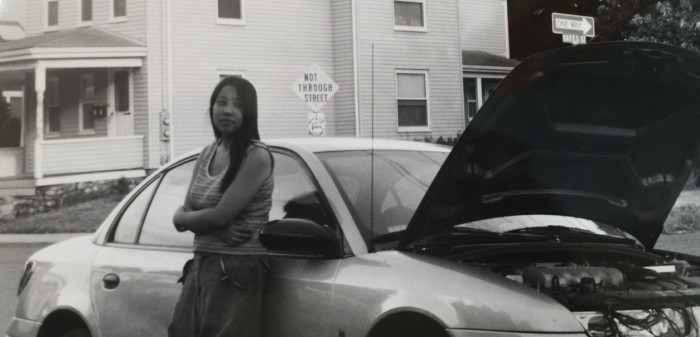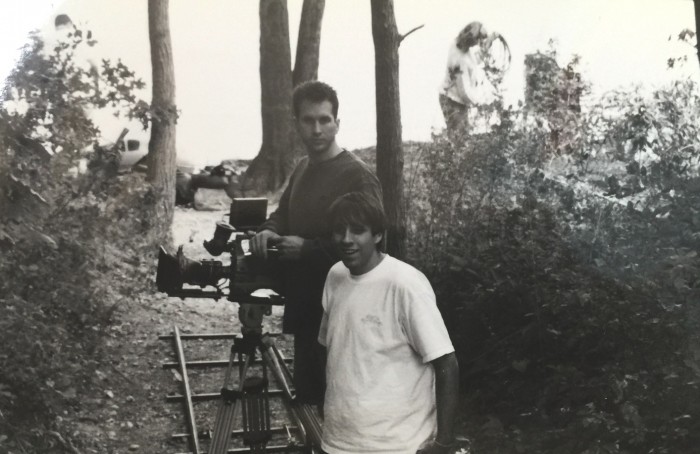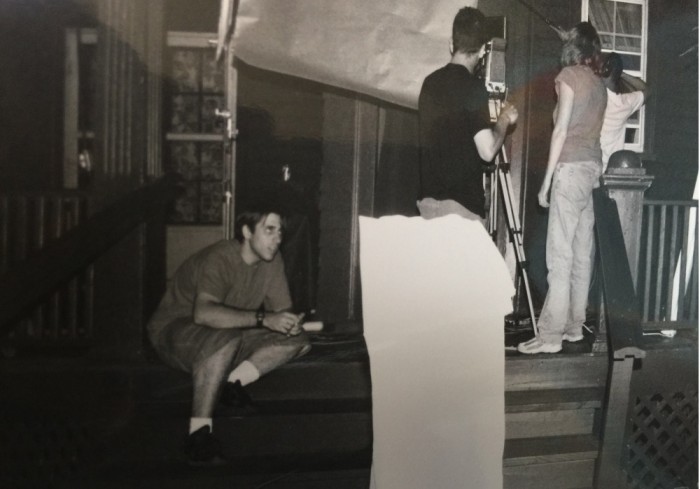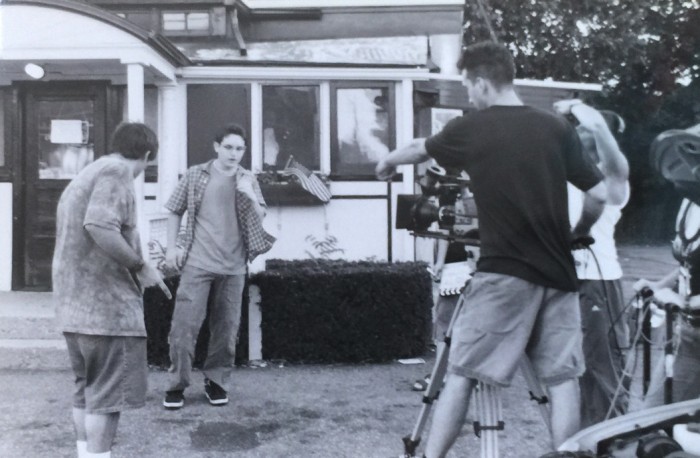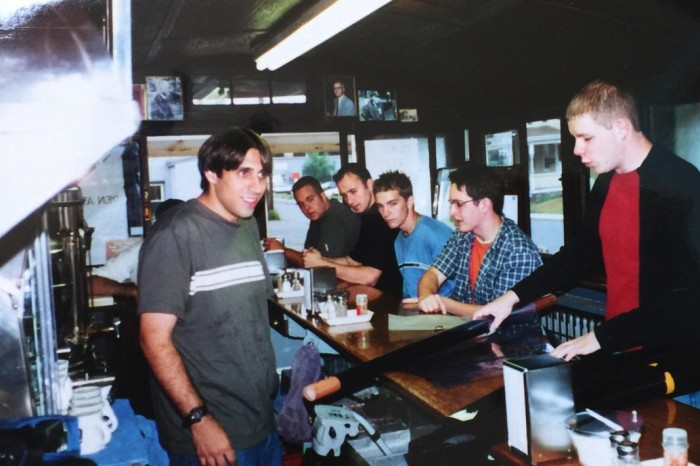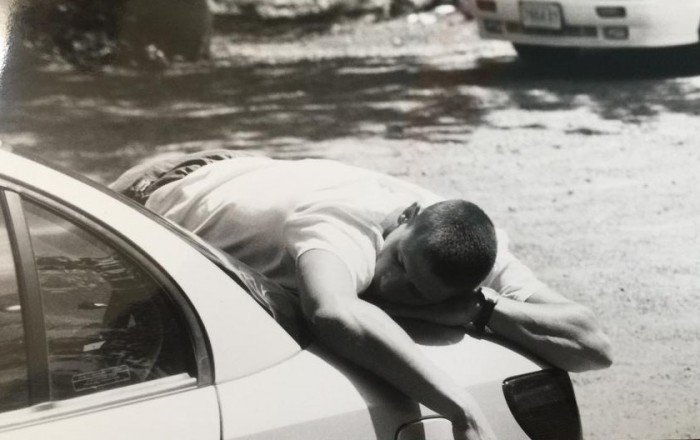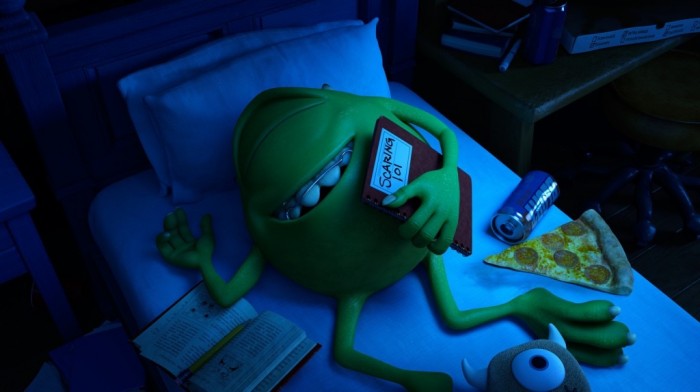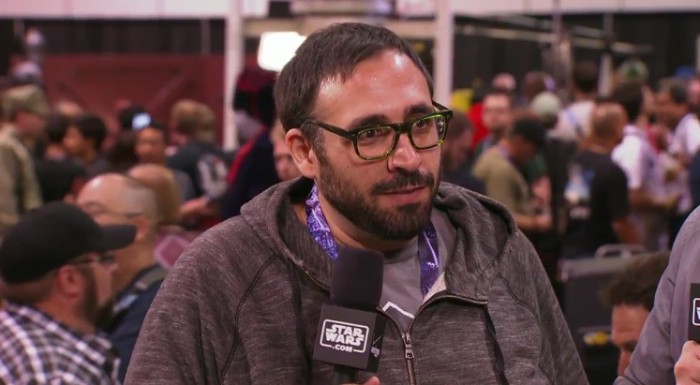My Name Is Peter Sciretta And I Once Directed A Feature Film (Watch The Movie Trailer)
My name is Peter Sciretta, you probably know me as the creator and editor of the movie blog /Film, aka slashfilm.com. What you probably didn't know is that I once directed an independent feature film. Before I started writing about movies, I wanted to make movies. Its a part of my life I have rarely talked about, and I thought now was a good time to share the story.
I'm sharing this story with you now because when I posted a Throwback Thursday photo last week of me on set, many followers/readers had questions and wanted to know more. So here it is the quick details on the feature film I co-directed in 2002, along with a trailer for the film, which will never be released.
But before we get to the trailer, lets start with the story...
Growing Up With Movies
Much like many of you, I grew up loving movies. Friday night in my house was HBO night, and my family would get together in the family room (our tv room) to watch the latest premium cable movie release. When my mother was diagnosed with cancer, I spent many nights in the hospital with her. The nights I wasn't at the hospital I was escaping the reality of the situation through movies on VHS tapes we rented from Blockbuster.
After my Mom's death, me and my dad moved from Springfield to my father's hometown of Natick, Massachusetts. I quickly discovered Video Paradise, a downtown independent video store. The old man who ran the shop would recommend all kinds of older movies I probably never would have discovered myself. My weekends were spent going to see the latest releases at either the General Cinema near Shopper's World Mall, or the much crappier Lowes Theatre across the street, which sometimes won the better release that week. Me and my friends preferred to stay away from that multiplex as it had small theaters, bad sound and gummy bears stuck to the tiny screens.
Making Movies as a Kid
My middle school friends and I would shoot movies with my father's camcorder in the back yard or in our house. Most of them were not very planned out, shooting in order as we made everything up with all the visual effects being done in-camera or practically. The best of the bunch was a story which involved a family which goes on vacation, allowing the son's hamster to break out of his cage and enjoy the house by himself. But when the house is targeted by a duo of burglers, the pet hamster must stop them through a series of elaborate traps. You could hear the hamster's funny thoughts through voice over, it was essentially Home Alone meets Look Who's Talking. It was fun but it wasn't a real movie — I think it maybe clocked in at 25 or 30 minutes long.
After my friends begun getting their licenses, we would make our way to movie theaters outside of our usual radius. I would see midnight revivals of classics at the AMC Theater near Fenway Park, and I eventually found the Landmark Theater in Kendall Square which showed all sorts of movies that weren't playing in my town. Its here where I saw films like The Blair Witch Project, Run Lola Run and Timecode.
I fell in love with independent cinema at The Landmark, which is one of the reasons I applied to become a volunteer at the Sundance Film Festival. I would travel to work every year for two weeks and consume 4 dozen films on my hours off. I would return home and have movie nights at my apartment where I would screen good indie films I discovered at the festival that my friends might not otherwise ever see.
I was trying to consume every movie I could possibly get my hands on, plowing through the filmographies of famous directors and working my way down IMDb's top 250 films of all time. To me it was magic, and I was trying to figure out how it all worked. I would rewatch my favorite movies like Back to the Future over and over, creating diagrams of how the story arcs connected and drove the plot, how exposition and jokes were set up early to be paid off much later. I would draw maps of the action sequences and figure out how director Robert Zemeckis and his cinematographer Dean Cundey shot the moving action and how the editors constructed the footage together to form a moving narrative.
I was working as an overnight manager at a White Hen convenience store (now a 7-11) on Route 27 in Natick. I think I took the job because I was partially inspired by Kevin Smith, and like a lot of young people, didn't realize which parts of his story were important to emulate. But its probably one of the best jobs I ever had because it allowed me to watch and analyze movies on my laptop and read books about the filmmaking and screenwriting processes.
Working 11pm to 7am, I dealt with a slow stream of drunks at night and the early morning coffee crowd in the morning, but the hours in between were pretty dead and as long as I was able to accomplish my list of responsibilities I was able to use the rest of the time as I saw fit. So it became my self-designed film school. I can't tell you how many books and movies I went through working at that counter, but it would probably shock most people.
Making 'Escaping Reality'
My friend Elaine Mak was learning film production at Regis College and she would tell me about the short films she was working on. I suggested we make a movie. Not a short film, but a feature-length movie. Its the kind of suggestion that can only come from someone who is young and stupid enough not to be intimidated by the enormity of the proposal. I had been saving money to eventually go to one of those hands-on film schools like Full Sail, New York Film Academy or LA Film School. And somehow I had the bright idea to instead spend the money on a film. Plus, if we did it together, we'd have twice the resources, connections and money.
So we got together and over the course of handful of months, wrote a screenplay titled Escaping Reality. The coming of age drama followed four teenagers on the run from the cops. Headed to Canada to escape their problems, the friends are forced into confronting their issues with one another and themselves. The screenplay read kind of like Clerks or Slacker, lots of existential and melodramatic conversations. We wrote the script with a distinct visual feel, from emulating our heroes like the hip hop montages of Darren Aronofsky's Requiem for a Dream and experimenting with split-screen storytelling, which was in vogue thanks to the tv series 24.
Elaine worked for the head of the video department at her college so we were able to score all the equipment we needed for free, and the school also let us use the grounds and certain halls for shooting — it was almost like our back lot. We rented out a casting office in downtown Boston and held auditions, and even though we weren't able to promise pay, we had lines going down the block to try out for the movie.
One thing I knew from working various crew positions on short films around Boston was that if you can't feed your cast and crew, you are doomed. So a lot of our budget went into catering, and it costs a lot of money to feed a set consisting of a couple dozen people.
While we didn't have enough money to afford to pay the actors, we knew that if we didn't pay some of the key crew members, the film would turn out horribly. So we hired a professional director of photography from New York, and was lucky enough to find a great sound engineer Jason Tower who had never done film production and was willing to work for cheap.
Its almost impossible to make an independent film in most cities these days, but living in a small town it seemed like almost everyone wanted to help or was willing to donate something — a location, props or even some snacks. We were able to shoot in a small grocery store in Wayland for free (although they wouldn't let us shut down the store and so instead of laying down dolly tracks we pushed our Dp with the camera in a shopping cart — and it didn't look bad). We did have to pay to rent out the historic Casey's Diner in downtown Natick, but most other locations we filmed at were either donated or "stolen".
We had never shot anything of this magnitude and none of the books we read could prepare us for this challenge. Our first day of shooting was planned for a 12 hour shoot, but nothing went as planned. I commented as we drove home that the sun was rising just as it had as we had driven to set at the beginning of that day — we were up for more than 24 hours on that first day of filming.
Making Movies, Making Trouble
Every day making a movie is a different challenge, and one day in particular during our shoot saw us at the other end of a cop car, not once or twice, but three separate times. The first happened after we filmed a scene at a small restaurant. The owner was present for the filming, but decided to leave as we filmed a sequence where the main characters leave the establishment, walk to their car and drive away. He locked the inside door of his restaurant but left the front door open, so that we could film them leaving through the front doors. Of course, while the crew set-up the lights for this night scene, one of the actors leaned on the inside door setting off the alarm.
Cops quickly responded to the alarm but luckily they were police officers I knew from my job at the White Hen. (Officers would often drop in for some free coffee and a chance to chat a few minutes during their overnight shifts.) So the fact that an alarm was activated and the owner was nowhere to be found didn't seem to bother them because they had heard all about the movie I was working on.
Later that night we were back outside my apartment, which was at the end of the street near the Natick Arm Labs, where they advanced warfare technology was developed. The director of photography and crew members were attaching a car mount to the lead actor's car. We also had to install a lighting rig inside the car as the scenes took place in the darkness of night and we needed to see the actors' faces. All of a sudden, a bunch of cop cars screeched into the parking lot and surrounded us from all sides.
Turns out one of the army guys reported us because they thought we were attaching some gun or bomb to a car and planned to drive it into the Labs. Ridiculous, I know, but we ended up walking away with a ticket for disturbing the peace — which is strange since we weren't making much noise but the cop cars definitely woke the apartment building and neighborhood up.
Later that night we were doing an overnight shoot with the actors in the picture car driving around as my co-director Elaine, our DP and I followed in a second car. I had a big VCR/TV combo on my lap which we had rigged to an RF receiver so we could monitor the takes in the car in front of us from 30 feet back. We would communicate with and give direction to the actors using walkie talkies. We were kind of unhappy with the visuals outside the car as it was mostly just darkness, so we decided to drive around a main drag in Wellesley which was nicely lit up with street lights. And of course this is how we attracted the attention of cops for the third time in just 8 hours.
The picture car got pulled over because the cops saw the huge camera which was rigged to the hood. It was professionally rigged, but we didn't have a permit for it. But they also pulled over the car because one of the tail lights was out, something the actor told us about before filming but somehow we thought wasn't worth fixing. The character would be the type to be driving a car with a smashed tail light.
The funny thing was that the camera was still rolling and we were watching the whole thing go down from 30 feet back. The police officer comes to the drivers side and explains the offense and when he asks why one of the passenger wasn't wearing his seat belt, the actor explained that his character in the movie doesn't think he needs one.
The officer wasn't amused and even though we should have gotten in much more trouble for the unpermitted contraption on the top of the hood, we were lucky to walk away with a $250 ticket for the tail light. (Elaine and I paid for the actor's ticket.) I still have the raw tape of this police encounter somewhere in a closet.
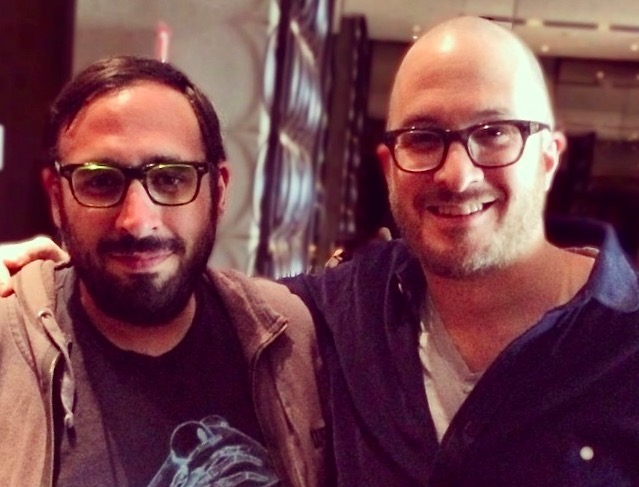 Escaping Reality was never completely finished, but the almost-completed edit is somewhere on a hard drive somewhere. For years I haven't talked much about my experiences making the movie. Through my work building up /Film, I have been lucky to become friendly with some of the filmmakers I love. One of them is director Darren Aronofsky, who during one chat offered to review Escaping Reality for /Film if I would let him watch a copy. I told him, "no way, never." He smiled.
Escaping Reality was never completely finished, but the almost-completed edit is somewhere on a hard drive somewhere. For years I haven't talked much about my experiences making the movie. Through my work building up /Film, I have been lucky to become friendly with some of the filmmakers I love. One of them is director Darren Aronofsky, who during one chat offered to review Escaping Reality for /Film if I would let him watch a copy. I told him, "no way, never." He smiled.
But now is the time to (stupidly) share more than I've ever shared before... because why not? While we were editing, we put together a promotional trailer for the film which shows too much of the story, even by today's lax movie trailer standards. You can watch the Escaping Reality trailer below. Please don't be too mean in the comments below :)
Escaping Reality Trailer
The Escaping Reality trailer is melodramatic, it shows a visual style that is of its time, and it also has that "shot on miniDV" cheap look which is now unmistakeable.
Its also worth noting that our production company was named "Open Road Films", but this was ten years before AMC and Regal Entertainment started their own film distribution company with the same named (their films include End Of Watch, Jobs, Chef and Machette Kills).
I'm both proud and embarrassed of my experience making Escaping Reality. I see all its flaws (too many) but am still proud that I made it. Making a movie is a ton of work and it can be a lot of fun. It was probably the greatest learning experience of my entire life, and for many years before /Film took off it was my greatest accomplishment.
I met some of my best friends for many years filming the movie: Zach Lawrence who sadly recently passed away, and my co-director Elaine Mak. She met her now-husband Jason on the film; he was our sound guy, and they are now expecting a child.
I recently showed my friend Adam Stein the above trailer and he told me that the story of my first film reminded him of this video from Ira Glass on the Creative Process.
Lessons Learned
After making Escaping Reality, I came to a bunch of realizations:
I'm sharing this story with you because when I posted a Throwback Thursday photo last week of me on set of the film, many readers had questions and wanted to know more.
This isn't the story of a guy who dreamt of being a great filmmaker and made it happen. I'm sure I could have worked at it and worked at it and gotten much better but I realized that it wasn't what I wanted to do (that said, someday I might jump back into screenwriting or development, as those aspects still very much interest me). But I think its an important moment to realize the difference between a dream you have and finding real fulfillment for yourself. Having that realization is not giving up.
I was recently talking with my girlfriend Kitra about the ending of Monsters University, and how much I love that a big budget animated sequel aimed at children could have such a gutsy end message. I've found a number of times in my life that sometimes you spend a significant amount of time and energy going down one path, and only until you get to the end do you realize that you should be on a totally different path. That realization can be very powerful. For me the realization that I didn't want to be a director greatly impacted my life. /Film certainly wouldn't exist without it.
I never wanted to be a movie critic or a film journalist, and have never really considered myself critic. When I was a child, movies brought my family together. When I was a teenager, it brought my friends together. I love the communal experience of cinema.
Later in life, I would come home from my trips volunteering at the Sundance Film Festival and hold screenings in my apartment of great little indie films that my friends might not otherwise have ever seen. I loved geeking out with my friends over trailers for upcoming movies, talking about the latest Star Wars prequel rumors, drooling over geeky pop culture collectibles I couldn't afford, speculating about the filmmaker's true intentions in some of my favorite movies and trying to figure out how some of the movie magic was created.
I somehow found a way to do all of that on a larger scale with a much larger community. Thanks for being a part of it.

